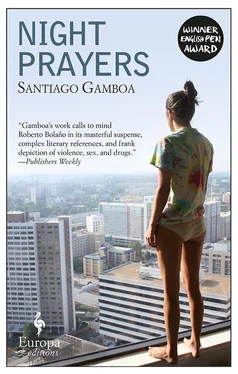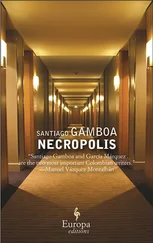Every night, Monsieur Echenoz had a new story to tell, something to give his opinion about or to teach me, something to contradict, always with the same shameless cynicism. He asked me to tell him about my course, and I talked to him about authors like Mario Bunge, Ernst Cassirer, and György Lukács, especially The Destruction of Reason , and he knew them, reduced them to comprehensible phrases, rejected them, and criticized them in a lucid way that I’d then repeat in class, and the other students would look at me in surprise, where does she get these ideas from? Sometimes Monsieur Echenoz would be interrupted by a violent coughing fit that would drain the color from his face. He had pulmonary emphysema. He had been an alcoholic three or four times during his life. He was dying and would say to me: if only I could get up and go out to buy cigarettes and alcohol, nothing worse can happen to me, I’m going to die soon anyway; I thought to bring them myself, but if his children found out they might report me and I would go to prison for identity theft.
One day I asked him if he had known Malraux and he said yes: when he was very young, in Hong Kong, he’d had to accompany him during an official visit, when Malraux was minister of culture. That was when he had dedicated his book to him. And he added: an arrogant, unscrupulous man. He would have given anything to be richer, more famous, and more powerful than he was, but deep down he never stopped being a parvenu. He actually despised him, and the only reason he kept that book was to remember the irritation such people aroused in him. Who did he admire? I asked, and he said: Céline, a writer who had the courage to say what all of France thought, and who kept saying it right to the end, when saying it earned him a prison sentence. Or Jules Barbey D’Aurevilly, accused of being a pornographer and a monarchist in a country where everybody is a monarchist and a pornographer. He liked Jarrès and Pierre Loüys. Jean Genet too, except when he campaigned for noble causes, and he said, angrily: I can’t stand writers who support noble causes! They’re opportunists who thrive on other people’s blood, hypocrites. When the streets are running with blood, the only sensible advice is that of Baron Rothschild: to buy property. Among contemporaries he admired Houellebecq, because in him he recognized that same spirit unconstrained by conservative morality. France had always had writers like that, according to him, because that crudeness and coldness was part of the Gallic chromosome. He took as an example the language itself, and said: French, which people think is a pretty, sonorous language, is one of the hardest and most hostile. You just have to look at its cruel expressions for referring to cruel things: elle s’est fait violer! (“She had herself raped” instead of “she was raped.”) It’s a language of brute peasants! Only the wicked and the homicidal can get beauty from it, people like Rimbaud or Baudelaire, or like the Marquis de Sade, who was confined to a dungeon and who, according to a very bad film, wrote with his own shit, which is quite ridiculous, of course.
As I climbed the steep, dark, gloomy streets of Upper Chapinero, I would ask myself, what will Monsieur Echenoz tell me about today? Then I started to do my classwork with him. He would tell me to reach him this or that book, and read it to him. Sometimes he himself looked at the index. Of course he couldn’t read aloud, because he didn’t have enough air in his lungs, but I could, and in this way we advanced. I would write and he would read. He would make comments, help me with my writing. He was very strict about words. He always said that ideas were an illusion of language and that’s why in writing you had to be hypnotic, precise, and direct. That’s the one truth, he would say: that which is well expressed, which convinces through its form. I took note of this and then read over what I’d written and realized the number of extraordinary things I was learning with him.
One night, about one in the morning, he had such a strong fit of coughing and choking that I had to call an ambulance. They gave him oxygen and took him away. I wanted to go with him, but one of his sons had arrived and they wouldn’t let me get in the ambulance. I thought he was going to die and I felt really anxious. They kept him in the Andes Medical Center for three weeks; I spent them keeping my eye on my cell phone in the hope that they would call and say: you can come back, Monsieur Echenoz is home again.
It was then, during those days of waiting, that the story broke in the press of eleven young men from Soacha, first presented as “disappeared,” and then reported as killed while fighting the army near Ocaña in Santander province. It was a great scandal, do you remember? Uribe went on television and said they weren’t disappeared but criminals, who had fallen in combat against the army. The family said they hadn’t been guerrillas, just unemployed young men. Uribe defended the army, but people started to protest, to go out on the street. Cases came to light in other parts of the country and there were more testimonies and accusations. The army put on a brave face: the safety of the citizens rests on our shoulders and our blood, the army is tireless in its task of building peace, these lies are being spread by terrorists and their accomplices, decent people have nothing to fear, we are an honest, humane army, our weapons are the basis of a new society, free from the scourge of violence, long live the state of law, long live President Uribe.
As was to be expected, Mother brought up the subject at dinner, saying, what’s the problem? why all this fuss over a bunch of dope fiends? Father refused to take part in the discussion, in the hope that it would die out by itself, but I couldn’t just bite my tongue, so I said, since when have we been on the side of the murderers? what’s happened to this family? when are you going to realize what’s going on in this country? and Mother lost her temper and retorted, what’s going on in this country isn’t what those terrorists at the National say, they only know what’s going on in the country that belongs to FARC and ELN, not in ours; the president, who is actually the president and not just some journalist, already explained what happened on television, and so did the attorney general, and they already know that those guys really were fighting the army, and you know how it is, those who live by the sword die by the sword, and I said, those poor guys were murdered, that’s social cleansing, like the paramilitaries do in other regions, social cleansing done by the army to earn rewards, it’s a State crime and Uribe is covering it up, and then Father got into the discussion and said, oh, Juanita, stop talking bullshit, how can it be a State crime when the army faces up to bandits, on the contrary, it’d be a crime if they didn’t defend us, Juanita, what they tell you at the university is really very twisted, you saw the president speaking, you saw the attorney general confirming that they had died while fighting, do you think they’re lying? do you think the president and the attorney general, the two highest authorities in the land, are lying? no, Juanita, let’s not exaggerate either, but I said to both of them, yes, they are lying, those boys were murdered, I believe the mothers, and then Mother said, oh, yes? and what would you have the mothers say about those lazy bums? they should have brought them up better.
I was so angry that the following Sunday I went with two fellow students to Soacha and we took part in a demonstration on behalf of the disappeared; I saw powerless women carrying pictures of their sons, raising banners, and weeping and shouting the names of those young men, some of whom had been brought back to them in bags, but not all; some said that their sons still hadn’t come back, not even dead, and my fellow students and I started shouting, and I felt grief and infinite pity, because what these poor mothers were asking for, that is, justice and truth, seemed such a crazy idea, a princely whim, because, as my parents said, who was going to question what the president and the attorney general both said, but I thought, anyone seeing these women walking, so dignified in their grief, anyone seeing how some collapse and fall on the ground and the others stop the procession and lift them up, anyone seeing that can only believe in them, and so I grabbed the arm of one of them and started to call out the name of her son, a boy who could have been my age or Manuel’s, I started to shout and she clung to me and we walked, and I noticed that she smelled of oil and onion and fresh coriander, and I thought, before coming to demonstrate these women left food ready for their other children and made the beds and washed clothes, and I felt something similar to the day I started at the National, and I thought again, this is my country! not the country of the hypocrites, not the country of those who close their eyes or the country of the murderers, and I was so moved that I started to cry and it was the woman who consoled me, saying, why are you crying, girl? and I said, I’m crying for all this, for what they did to you, because there are things that can never be made up for, and I’m crying with anger over the lies and the cynicism, and she passed her hand over my head and said, calm down, girl, keep walking, and I was able to do so, but at each step I told myself, it’s important to know and important to take revenge, there must be something I can do.
Читать дальше












